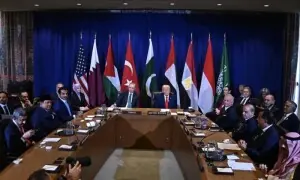After a fiery address at the United Nations General Assembly on Tuesday, where he opposed the growing wave of global recognition for a Palestinian state, US President Donald Trump convened a high-level meeting with leaders of Muslim-majority countries to present Washington’s plan for ending the war in Gaza.
Prime Minister Shehbaz Sharif and Foreign Minister Ishaq Dar represented Pakistan at the gathering, alongside leaders from Saudi Arabia, Qatar, the UAE, Egypt, Jordan, Türkiye, and Indonesia.
The meeting, held on the sidelines of the 80th UNGA session, brought together regional heavyweights in an unprecedented show of diplomatic coordination. Ahead of formal consultations, Trump told his guests:
“We have to get the hostages back … This is the group that can do it, more than any other group in the world … so it’s an honour to be with you.”
Since October 7, 2023, Israeli strikes in Gaza have killed more than 65,000 people in response to the Hamas attack and the taking of hostages.
Trump also emphasised the urgency of ending the conflict: “We had 32 meetings here, this is the one that’s very important because we’re gonna end something that should’ve probably never started.”
Qatari Emir Sheikh Tamim bin Hamad Al Thani responded to Trump’s comments by thanking him for hosting the meeting.
“We count on your leadership as well to end this war and to help the people of Gaza,” he said.
Pakistan’s consistent advocacy
Prime Minister Shehbaz Sharif, while talking to Pakistani journalists, welcomed Trump’s commitment, describing it as evidence that the US leader was “indeed a man of peace”.
He recalled Washington’s role in preventing a potentially devastating conflict between India and Pakistan back in May, adding: “For that we thank him from the depths of our hearts.”
Foreign Minister Ishaq Dar, in an earlier UN engagement, highlighted the humanitarian catastrophe in Gaza, describing it as a “graveyard for humanity” and urging the international community to move beyond statements to tangible action.
Pakistan’s participation reflects a careful balancing act: maintaining constructive engagement with Washington while insisting on Palestinian sovereignty, adherence to international law, and a two-state solution. In doing so, Islamabad aligns with Arab states that reject unilateral solutions undermining Palestinian self-determination.
Anatomy of Trump’s proposal
According to reports from Israel’s Channel 12 and US-based Axios, President Trump’s plan envisions:
- An immediate ceasefire and the release of hostages, both alive and
deceased - Phased Israeli withdrawal from Gaza
- Governance excluding Hamas but incorporating the Palestinian
Authority - Deployment of Arab and Muslim peacekeepers to secure Gaza and
facilitate Israel’s withdrawal - Internationally supported reconstruction and transition programmes
funded by regional contributors
These details were reportedly shared with Israeli Prime Minister Benjamin Netanyahu, though Israel did not draft the plan.
In interviews with various US channels, Secretary of State Marco Rubio framed the proposal in long-term terms.
“The only way to a permanent solution to the challenge between Palestinians and Israelis is a negotiated settlement,” he said.
“One in which the Palestinians are going to have a territory and they’re going to govern it, but it cannot be one that’s going to be used as a launchpad for attacks against Israel.”
Describing the New York meeting as “one last shot” in an interview with CBS News, Rubio emphasised its goal: ending the Gaza conflict, securing all remaining hostages, and establishing a humanitarian relief framework.
Multiple challenges
Trump’s plan attempts to address three simultaneous crises: Israel’s security concerns, Palestinian humanitarian needs, and the geopolitical desire of the US to position itself as the ultimate mediator.
However, the plan faces multiple challenges, including legitimacy, as excluding Hamas would risk alienating a significant portion of the Palestinian population.
Secondly, the plan could have regional consensus. Turkish President Recep Tayyip Erdogan warned that proposals affecting Gaza’s population without their consent constituted “a very different threat to world peace.”
Thirdly, the on-the-ground realities pose extraordinary challenges. With more than 65,000 Palestinians reported killed since October 7 — most of them civilians — achieving a swift diplomatic settlement will be exceedingly difficult.
Trump’s outreach contrasts with his UNGA speech, where he criticised European recognitions of Palestine as rewarding Hamas for “horrible atrocities” and pressed instead for a “ceasefire-for-prisoners” deal.
Meanwhile, 154 countries have recognised Palestine, underscoring the limits of Washington’s unilateral influence.
Humanitarian and political implications
Beyond ceasefires, Trump’s plan seeks to reshape Gaza’s political landscape — empowering the Palestinian Authority while relying on regional peacekeepers. While this could stabilise governance temporarily, it risks inflaming political tensions if not paired with inclusive, locally sanctioned negotiations.
Pakistan’s emphasis on legality, human rights, and the two-state solution ensures that its stance remains morally credible and aligned with international law. This approach also strengthens Islamabad’s credibility among Muslim-majority nations increasingly wary of unilateral Western initiatives.
US mediation shows assertiveness but future remains uncertain
Trump’s Gaza plan embodies both ambition and risk. Diplomatically, it signals an assertive US effort to mediate a complex conflict, yet long-term prospects remain uncertain. Pakistan’s careful balancing — engaging with Washington, reaffirming Palestinian rights, and urging immediate humanitarian relief — illustrates the nuanced role smaller, principled actors can play in global crises.
As Rubio framed it, the New York meeting was “one last shot” at ending the conflict, securing hostages, and establishing humanitarian relief.
For Pakistan, the challenge lies in ensuring that this diplomatic opportunity upholds justice, protects human life, and preserves the possibility of a sovereign, viable Palestine.
Discover more from Brackly News
Subscribe to get the latest posts sent to your email.


